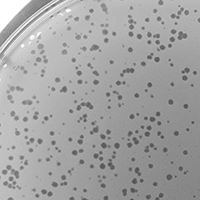Arthrobacter phage Ormyrus
Add or modify phage thumbnail images to appear at the top of this page.
Know something about this phage that we don't? Modify its data.
| Detailed Information for Phage Ormyrus | |
| Discovery Information | |
| Isolation Host | Arthrobacter pascens NRRL B-1814 |
| Found By | Andrew Cameron |
| Year Found | 2025 |
| Location Found | Lexington, GA United States |
| Finding Institution | Emory University |
| Program | Science Education Alliance-Phage Hunters Advancing Genomics and Evolutionary Science |
| From enriched soil sample? | No |
| Isolation Temperature | 30°C |
| GPS Coordinates | 33.910022 N, 83.019972 W Map |
| Discovery Notes | Soil was collected from a damp creekbed in the woods near Lexington, GA. Soil was sandy and waterlogged, although the creek had dried up in patches and was not actively flowing at time of collection. Phage was initially isolated on an equal-parts mix of four different Arthrobacter strains (A. globiformis B-2979, A. pascens B-1814, A. globiformis B-4425, A. humicola B-24478). After initial purification, the phage was found to plaque only on A. pascens 1814 A and A. globiformis B-4425. Subsequent stages of purification were done only with A. pascens B-1814. Prior to naming, this phage was designated “S2.5” throughout isolation and purification. Isolated in the lab of Dr. Nic Vega. |
| Naming Notes | Ormyrus is a genus of chalcid wasps, most of which are specialized parasitoids of gall-forming insects. I have developed a great interest in oak galls induced by Cynipid wasps, and recently attempted to rear some oak galls that I collected on Emory’s campus. I was surprised to find that most (maybe all?) of the wasps that emerged were parasitoids. Among these impostor wasps was a very beautiful Ormyrus individual. Seeing this, I was inspired to confer the name of this parasitoid onto another much smaller but surely no less beautiful parasitoid. |
| Sequencing Information | |
| Sequencing Complete? | No |
| Genome length (bp) | Unknown |
| Character of genome ends | Unknown |
| Fasta file available? | No |
| Characterization | |
| Cluster | Unclustered |
| Subcluster | -- |
| Annotating Institution | Unknown or unassigned |
| Annotation Status | Not sequenced |
| Plaque Notes | Plaques vary in size, but typically do not exceed 1.5mm in diameter. Generally circular with slight irregularities in shape. Clear. Margins well-defined. |
| Has been Phamerated? | No |
| Publication Info | |
| Uploaded to GenBank? | No |
| GenBank Accession | None yet |
| Refseq Number | None yet |
| Archiving Info | |
| Archiving status | Not in Pitt Archives |
| Available Files | |
| Plaque Picture | Download |
